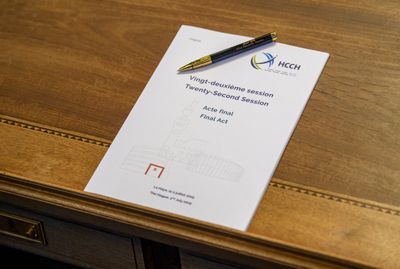Judgments Convention – No Thanks?
On September 1st, 2023, the 2019 Hague Judgments Convention will enter into force for the Member States of the EU and Ukraine. According to the HCCH, the Convention is “a true gamechanger in international dispute resolution”, which will “reduce transactional and litigation costs, facilitate rule-based multilateral trade and investment, increase certainty and predictability” and “promote effective justice for all”. The international conference taking place in Bonn later this week will likely strike an equally celebratory tone.
This sentiment is not shared universally, though. In a scathing article just published in Zeitschrift für Europäisches Privatrecht (ZEuP) entitled ‘Judgments Convention: No Thanks!‘, Haimo Schack (University of Kiel) labels the Convention as “evidently worthless”.

Schack comes to this damning conclusion in three steps. First, he argues that the 2005 Choice of Court Convention, the first outcome of the decades-long HCCH Jurisdiction Project, has been of minimal use for the EU and only benefited Singapore and London. Second, he points out the limited scope of the 2019 Convention, which is not only (inherently) unable to limit the exorbitant exercise of jurisdiction or avoid, let alone coordinate parallel proceedings, but also contains a long list of excluded areas of law in its Art. 2 (including, most significantly, the entire field of intellectual property: Art. 2(1)(m)). Schack argues that combined with the equally long list of bases for recognition and enforcement in Art. 5, the Convention will make recognition and enforcement of foreign judgments significantly more complicated. This effect is exacerbated, third, by a range of options for contracting states to further reduce the scope of application of the Convention, of which Art. 29 is particularly “deadly”, according to Schack. The provision allows contracting states to opt out of the effect of the Convention vis-à-vis specific other contracting states, which Schack fears will lead to a ‘bilateralisation’ similar to what prevented the 1971 Convention from ever getting off the ground, which will reduce the 2019 Convention to a mere model law. All in all, Schack considers the Convention to do more harm than good for the EU, which he fears to also lose an important bargaining chip in view of a potential bilateral agreement with the US.
Leaving his additional criticism of the HCCH’s ongoing efforts to address the problem of parallel proceedings aside, Schack certainly has a point in that the 2019 Convention will not be easy to apply for the national courts. Whether it will be more complicated than a myriad of rarely applied bilateral conventions may be subject to debate, though. It also seems worth pointing out that the 1971 Convention contained a significantly more cumbersome mechanism of bilateralisation that required all contracting states to conclude additional (!) bilateral agreements to enter into force between any given pair of them, which is quite different from the opt-out mechanism of Art. 29. In fact, it seems at least arguable that the different ways in which contracting states can tailor their accession to the Convention to their specific needs and concerns, up to the exclusion of any treaty relations with a specific other contracting state, may not be the proverbial nail in the coffin as much as it might be a key to the Convention’s success. While it is true that these mechanisms appear to undermine the internationally binding nature of the Convention, bringing it closer to a model law than a binding treaty, they also make it possible to accommodate different degrees of mutual trust within a single legal framework. The fact that the 2005 Convention has preserved some degree of judicial cooperation between the EU Member States and the UK in an area now otherwise devoid of it may be testimony to the important purpose still served by international conventions in the area of international civil procedure despite – but maybe also as a result of – their increasingly limited, tailor-made scope(s).
Postscript: A more sophisticated reaction to the article (written by Holger Jacobs and myself) is forthcoming in ZEuP 1/2024.



I find that criticism outraged, wouldn’t that be founded by the pro arbitration group fearing to loose the profits which would go to state courts?